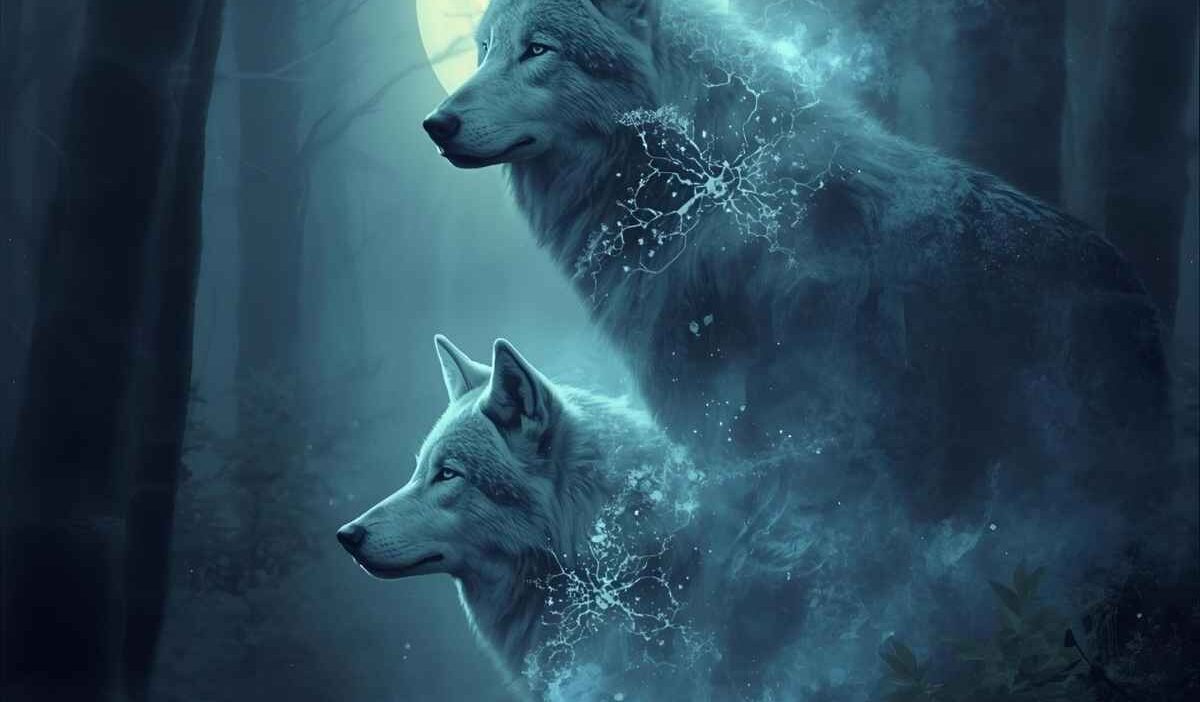When you dream of wolves, it often symbolizes your untamed instincts, inner power, or hidden fears. A dreamer encountering wolves may be facing social dynamics (pack vs. lone), vulnerability, or spiritual guidance.
Dreaming of wolves is fascinating because it merges the wild and the inner self. Wolves are powerful, mysterious creatures in human mythology, and in dreams they act as messengers from the unconscious. In this article, we’ll explore the general symbolism of wolves in dreams, dig into psychological and spiritual layers, break down the meaning of specific dream variations (eating wolves, sharing wolves, wedding wolves, etc.), present a real-life illustrative case, survey cultural and historical symbolism, offer psychological growth strategies, answer FAQs about wolves dreams, and close with a summary and call to action. Whether you’ve had vivid wolf dreams or are simply curious, this guide aims to help you interpret and integrate what your subconscious is showing you.
General Meanings, Symbolism & Psychological/Spiritual Interpretations of Wolves in Dreams
At its core, wolves in dream meaning points to a convergence of instinct, power, fear, and social dynamics.
Symbolism & Archetypal Layers
- In Jungian / depth psychology frameworks, animals like wolves in dreams tend to represent archetypes or shadow aspects of the psyche. The wolf can embody qualities we repress: dominance, aggression, untamed will, or survival instincts. Some depth psychologists assert that animals in dreams act as “guides, helpers, and saviors” rather than being literal parts of ourselves. dreamstudies.org
- The wolf is also tied to intuition and instinct. Its acute senses make it a potent symbol of inner knowing or the call to trust your gut. DreamApp+2wellbeing.com.au+2
- Because wolves are pack animals, they evoke social dynamics: leadership, belonging, hierarchy, and loyalty. A wolf dream might reflect how you function in groups or your longing to belong. Mindberg+3Dream Dictionary+3aidreamscope.com+3
Psychological Interpretation
- The subconscious may use the wolf image to draw attention to repressed fears or internal conflict. Dreams of wolves attacking or chasing often suggest avoidance of something threatening in waking life. Dreams+3Wolf Stuff+3Shuteye App+3
- The wolf may mirror your shadow self—traits you don’t like to admit: aggression, jealousy, competitiveness, or fierce ambition. Confronting wolves in dreams may invite you to integrate those hidden parts. dreams.xtarot.com+2dreamstudies.org+2
- Dreams are metaphorical and condensed (per Freudian “dream work” theory). A single image like a wolf can stand for multiple associations—fear, power, social threat, or spiritual call. Wikipedia+1
Spiritual / Mystical Perspective
- dreamstudies.org+3Centre of Excellence+3DreamApp+3
- A wolf appearing in a dream may represent a wake-up call—to stop ignoring your power, face your fears, or reclaim your voice. Wolf dreams can invite you to live more authentically. wellbeing.com.au+2Shuteye App+2
- The behavior, color, and interaction with the wolf in the dream refine its spiritual meaning. For example, a white wolf may signal purity or guidance; a black wolf may point to shadow work or concealed threats. aidreamscope.com+3Wolf Stuff+3Shuteye App+3
In sum, wolves in dream meaning is rich and multifaceted. The key to interpreting your own wolf dream lies in the details: the setting, the wolf’s actions and color, your emotional response, and your current waking-life circumstances.
Common Variations of Wolves in Dreams
Below are some of the more frequent dream scenarios involving wolves. Each has its own nuances and possible positive and negative interpretations.
: Eating Wolves (e.g. you eat a wolf or the wolf is eating)
Interpretation: To dream of eating a wolf is striking and uncommon. It may symbolize your attempt to assimilate the power or attributes of the wolf—asserting dominance over primal forces within you. Alternatively, it could represent the suppression of those intense aspects (fear, aggression) by swallowing or internalizing them.
- Positive angle: You are integrating your inner fierceness, turning a formerly wild part of yourself into conscious strength. Perhaps you’re mastering your impulses or fears.
- Negative angle: It might imply destructive over-identification: letting aggression dominate you, or “devouring” your own instincts in a destructive way.
If instead the wolf is eating you (you are being devoured), that variation is more ominous: it may reflect feelings of being overwhelmed by your fears or by powerful forces (inner or external). It might hint at betrayal, or a fear of being consumed emotionally by someone or something. JustAnswer+3Auntyflo.com+3Wolf Stuff+3
Making or Creating Wolves (e.g. you “create” a wolf or raise one)
If your dream involves creating or raising a wolf (breeding, nurturing, training), this could be your psyche’s way of working constructively with your wild side.
- Positive interpretation: You are cultivating inner strength, taming your instincts in a balanced way. This could mean growing leadership qualities or inner resilience.
- Negative interpretation: There is a risk of harnessing something too wild, or breeding a destructive aspect in yourself that later becomes uncontrollable.
This scenario is rarer, but when it appears it suggests deliberate inner work—actively shaping your untamed energy.
Sharing Wolves / Having Wolves With Others
Dreams where you share wolves or interact with wolves socially (the wolves belong to you and someone else, or you cooperate with them) highlight the social or communal side of wolf symbolism.
- Positive view: You may be forming alliances or trusting others with your strength. You are connected, cooperative, and able to balance individuality with group belonging.
- Negative view: Beware of over-sharing or giving too much power away—someone may misuse your trust or manipulate you under the guise of partnership.
This variation emphasizes relational dynamics: who you align with and how you use your inner power in the presence of others.
Birthday Wolves / Wedding Wolves / Special Occasion Wolves
Sometimes the mind frames symbolic elements into special contexts: imagine a birthday wolf or wedding wolf—these add layers of meaning.
- Birthday wolves: A wolf appearing or behaving in a birthday dream could suggest transformation or a rebirth of instinctual power. It might herald a new year of self-discovery or a fresh start in exploring your primal nature.
- Wedding wolves: A wolf in a wedding dream may point to union—perhaps the harmony of tame and wild within you. It could also hint at a tension between marriage, commitment, and wild independence.
In these special settings, the wolf bridges between the ordinary and the symbolic: interpreting these dreams invites reflection on purposeful transitions—birth, union, new phases.
Realistic Example / Case Study
Imagine Lisa, a 29-year-old creative professional, who dreamed three nights in a row of being chased by a black wolf. In each dream, the wolf came close, but she never turned to face it. She felt terrified yet curious.
When she journaled these dreams, she realized she was avoiding a difficult confrontation with her partner and suppressing a business idea she was passionate about. The wolf represented both fear and untapped potency. Gradually, she decided to bring the business idea forward and have the difficult conversation. Over time, her dreams shifted: instead of being chased, she dreamed of walking beside a grey wolf peacefully.
This illustrates how recurring wolves in dream meaning can mirror real-life psychological blocks—and how working consciously can transform them.
Cultural & Historical Symbolism of Wolves
To understand wolves in dream meaning fully, it’s valuable to survey how wolves have been viewed across cultures, myths, and history.
Mythology, Etymology & Sacred Wolves
- In Turkic and Mongolian myth, the grey wolf (“Bozkurt”) is revered as a guiding ancestral force. Wikipedia
- In Norse mythology, wolves are ambivalent: Fenrir is a destructive wolf destined to kill Odin at Ragnarök, yet Odin also has wolf companions (Geri and Freki).
- In many Native American traditions, the wolf is a teacher and pathfinder, a totem of loyalty, intuition, and deep instinct.
- Etymologically, the English word “wolf” traces to Proto-Germanic *wulfaz, linked to notions of “wolf” across Germanic languages, often bearing connotations of wildness and predation.
Cultural & Religious References
- In Biblical and Christian symbolism, wolves often represent deceit or danger (e.g. “wolves in sheep’s clothing”)—warning of false prophets or betrayal. YouTube
- In Arabic dream interpretation tradition, a wolf entering one’s home may suggest a hypocrite or deceitful person entering one’s life. Wolf Stuff
- In Chinese dream tradition, a wolf often signals caution, betrayal, or hidden enemies—but also alerts you so you may prepare. Wolf Stuff+1
- In folklore and fairy tales (Little Red Riding Hood, The Jungle Book), wolves are symbolic antagonists, reinforcing their archetypal edge: cunning, threat, or wild challenge.
The cultural layering of the wolf helps enrich your personal dream interpretation. The wolf is rarely “pure good” or “pure evil” in myth—it holds tension, transformation, danger, and guidance.
Psychological Insights & Personal Growth Advice
Interpreting wolves in dream meaning is just the beginning. To turn insight into growth, here are strategies:
Dream Journaling & Reflection
- Keep a dream journal. Upon waking, record every detail: setting, wolf color and behavior, emotions, and key symbols. Over time, patterns may emerge.
- Ask reflective questions: What part of me feels threatened? What power do I avoid? How do I act in groups or relationships?
- Over time, returning to earlier dreams can show your inner transformation (e.g. fear → peace).
Mindfulness & Dialogue with the Wolf
- Use active imagination (a Jungian technique): imagine dialoguing with the wolf. Ask it, “What do you want me to see?” or “Why are you here?” This helps you internalize its message. melissadaum+1
- Practice mindfulness to notice when in daily life you suppress or fear impulses. The wolf in the dream may be urging you to awaken to disowned energies.
Habit Change & Integration
- If your dream suggested confrontation, set small actions to face something you’ve avoided (a tough conversation, creative risk).
- Balance wild energy: engage in healthy outlets (physical exercise, creative freedom) to integrate primordial instincts safely.
- Seek supportive relationships or mentorship (the wolf pack metaphor)—you don’t need to face your wild self in isolation.
With time, your wolf dreams may shift: from chase or threat to companionship, guidance, or even celebration of inner power.
FAQs: Wolves in Dream Meaning
Q1. What do wolves in dream meaning usually symbolize?
Wolves in dreams typically symbolize primal instincts, power, social dynamics, or hidden fears. They often act as messengers urging you to address aspects of your unconscious or relationships.
Q2. Is dreaming of a white wolf different from a black wolf?
Yes. A white wolf often points to purity, spiritual guidance, protection, or positive transformation. A black wolf usually signals shadow work, concealed fears, or unresolved emotional conflict. The contrast helps deepen interpretation.
Q3. What does it mean if a wolf chases me in a dream?
Being chased by a wolf often represents avoidance—something you fear or neglect in waking life. It may be a suppressed emotion, confrontation, or responsibility that your psyche wants you to face.
Q4. If I dream I’m part of a wolf pack, what’s that telling me?
Joining a wolf pack in a dream suggests themes of belonging, loyalty, group dynamics, or leadership. It may reflect how you relate socially—or your desire for a supportive “pack.”
Q5. Can a wolf dream be a good omen?
Absolutely. If the wolf is calm, protective, or acting as an ally, it may herald inner empowerment, guidance, or successful integration of wild energy into your life.
Q6. What should I do after I have a wolf dream?
Record the dream in detail, reflect on your feelings and life contexts, and consider how the wolf’s message might apply to your waking life. Use techniques like journaling, dialogue, or gradual action to integrate insights.
Conclusion
Wolves in dream meaning offer a vivid window into the intersection of our instincts, power, fears, and social selves. Whether your wolf dream was frightening or soothing, it carries meaningful messages. From general symbolism to specific variations—eating wolves, wedding wolves, pack wolves—every scenario invites deep reflection. Cultural and historical myths enrich the layers, while psychological strategies help you translate dream wisdom into growth.

Olivia Bennett is a lifestyle researcher and holistic wellness advocate specializing in mindfulness, dream healing, and manifestation techniques. With a background in psychology and meditation therapy, Olivia writes to empower readers to achieve mental clarity and emotional balance through dream awareness. Her articles provide practical tips, spiritual insights, and real-life strategies for boosting intuition and creating a more meaningful life. Olivia’s work at DreamingSign.com inspires readers to use dreams as a tool for personal transformation.




